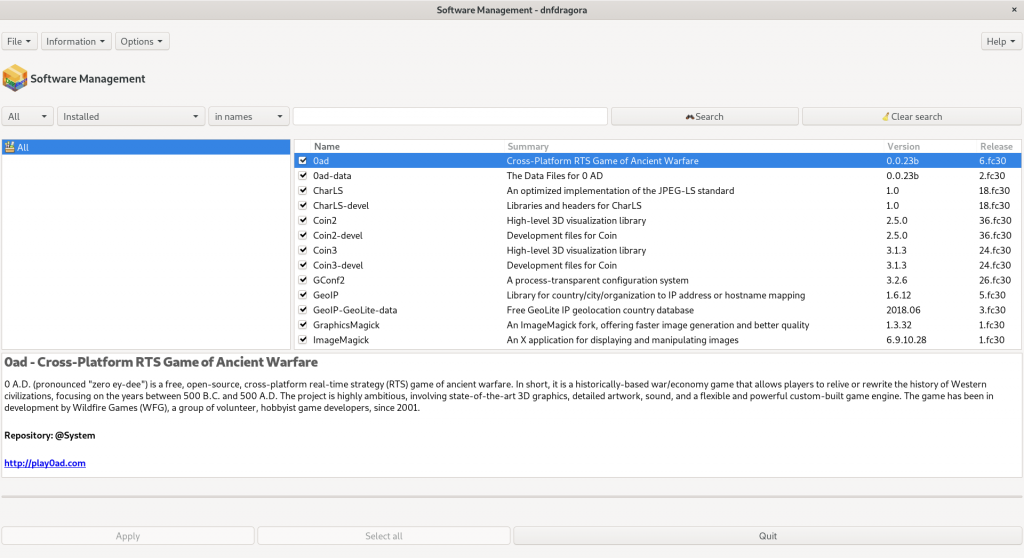19 KiB
RPM packages explained
Perhaps the best known way the Fedora community pursues its mission of promoting free and open source software and content is by developing the Fedora software distribution. So it’s not a surprise at all that a very large proportion of our community resources are spent on this task. This post summarizes how this software is “packaged” and the underlying tools such as rpm that make it all possible.
RPM: the smallest unit of software
The editions and flavors (spins/labs/silverblue) that users get to choose from are all very similar. They’re all composed of various software that is mixed and matched to work well together. What differs between them is the exact list of tools that goes into each. That choice depends on the use case that they target. The basic unit of all of these is an RPM package file.
RPM files are archives that are similar to ZIP files or tarballs. In fact, they uses compression to reduce the size of the archive. However, along with files, RPM archives also contain metadata about the package. This can be queried using the rpm tool:
$ rpm -q fpaste fpaste-0.3.9.2-2.fc30.noarch
$ rpm -qi fpaste Name : fpaste Version : 0.3.9.2 Release : 2.fc30 Architecture: noarch Install Date: Tue 26 Mar 2019 08:49:10 GMT Group : Unspecified Size : 64144 License : GPLv3+ Signature : RSA/SHA256, Thu 07 Feb 2019 15:46:11 GMT, Key ID ef3c111fcfc659b9 Source RPM : fpaste-0.3.9.2-2.fc30.src.rpm Build Date : Thu 31 Jan 2019 20:06:01 GMT Build Host : buildhw-07.phx2.fedoraproject.org Relocations : (not relocatable) Packager : Fedora Project Vendor : Fedora Project URL : https://pagure.io/fpaste Bug URL : https://bugz.fedoraproject.org/fpaste Summary : A simple tool for pasting info onto sticky notes instances Description : It is often useful to be able to easily paste text to the Fedora Pastebin at http://paste.fedoraproject.org and this simple script will do that and return the resulting URL so that people may examine the output. This can hopefully help folks who are for some reason stuck without X, working remotely, or any other reason they may be unable to paste something into the pastebin
$ rpm -ql fpaste /usr/bin/fpaste /usr/share/doc/fpaste /usr/share/doc/fpaste/README.rst /usr/share/doc/fpaste/TODO /usr/share/licenses/fpaste /usr/share/licenses/fpaste/COPYING /usr/share/man/man1/fpaste.1.gz
When an RPM package is installed, the rpm tools know exactly what files were added to the system. So, removing a package also removes these files, and leaves the system in a consistent state. This is why installing software using rpm is preferred over installing software from source whenever possible.
Dependencies
Nowadays, it is quite rare for software to be completely self-contained. Even fpaste, a simple one file Python script, requires that the Python interpreter be installed. So, if the system does not have Python installed (highly unlikely, but possible), fpaste cannot be used. In packager jargon, we say that “Python is a run-time dependency of fpaste“.
When RPM packages are built (the process of building RPMs is not discussed in this post), the generated archive includes all of this metadata. That way, the tools interacting with the RPM package archive know what else must must be installed so that fpaste works correctly:
$ rpm -q --requires fpaste /usr/bin/python3 python3 rpmlib(CompressedFileNames) <= 3.0.4-1 rpmlib(FileDigests) <= 4.6.0-1 rpmlib(PayloadFilesHavePrefix) <= 4.0-1 rpmlib(PayloadIsXz) <= 5.2-1
$ rpm -q --provides fpaste fpaste = 0.3.9.2-2.fc30
$ rpm -qi python3 Name : python3 Version : 3.7.3 Release : 3.fc30 Architecture: x86_64 Install Date: Thu 16 May 2019 18:51:41 BST Group : Unspecified Size : 46139 License : Python Signature : RSA/SHA256, Sat 11 May 2019 17:02:44 BST, Key ID ef3c111fcfc659b9 Source RPM : python3-3.7.3-3.fc30.src.rpm Build Date : Sat 11 May 2019 01:47:35 BST Build Host : buildhw-05.phx2.fedoraproject.org Relocations : (not relocatable) Packager : Fedora Project Vendor : Fedora Project URL : https://www.python.org/ Bug URL : https://bugz.fedoraproject.org/python3 Summary : Interpreter of the Python programming language Description : Python is an accessible, high-level, dynamically typed, interpreted programming language, designed with an emphasis on code readability. It includes an extensive standard library, and has a vast ecosystem of third-party libraries.
The python3 package provides the "python3" executable: the reference interpreter for the Python language, version 3. The majority of its standard library is provided in the python3-libs package, which should be installed automatically along with python3. The remaining parts of the Python standard library are broken out into the python3-tkinter and python3-test packages, which may need to be installed separately.
Documentation for Python is provided in the python3-docs package.
Packages containing additional libraries for Python are generally named with the "python3-" prefix.
$ rpm -q --provides python3 python(abi) = 3.7 python3 = 3.7.3-3.fc30 python3(x86-64) = 3.7.3-3.fc30 python3.7 = 3.7.3-3.fc30 python37 = 3.7.3-3.fc30
Resolving RPM dependencies
While rpm knows the required dependencies for each archive, it does not know where to find them. This is by design: rpm only works on local files and must be told exactly where they are. So, if you try to install a single RPM package, you get an error if rpm cannot find the package’s run-time dependencies. This example tries to install a package downloaded from the Fedora package set:
$ ls python3-elephant-0.6.2-3.fc30.noarch.rpm
$ rpm -qpi python3-elephant-0.6.2-3.fc30.noarch.rpm Name : python3-elephant Version : 0.6.2 Release : 3.fc30 Architecture: noarch Install Date: (not installed) Group : Unspecified Size : 2574456 License : BSD Signature : (none) Source RPM : python-elephant-0.6.2-3.fc30.src.rpm Build Date : Fri 14 Jun 2019 17:23:48 BST Build Host : buildhw-02.phx2.fedoraproject.org Relocations : (not relocatable) Packager : Fedora Project Vendor : Fedora Project URL : http://neuralensemble.org/elephant Bug URL : https://bugz.fedoraproject.org/python-elephant Summary : Elephant is a package for analysis of electrophysiology data in Python Description : Elephant - Electrophysiology Analysis Toolkit Elephant is a package for the analysis of neurophysiology data, based on Neo.
$ rpm -qp --requires python3-elephant-0.6.2-3.fc30.noarch.rpm python(abi) = 3.7 python3.7dist(neo) >= 0.7.1 python3.7dist(numpy) >= 1.8.2 python3.7dist(quantities) >= 0.10.1 python3.7dist(scipy) >= 0.14.0 python3.7dist(six) >= 1.10.0 rpmlib(CompressedFileNames) <= 3.0.4-1 rpmlib(FileDigests) <= 4.6.0-1 rpmlib(PartialHardlinkSets) <= 4.0.4-1 rpmlib(PayloadFilesHavePrefix) <= 4.0-1 rpmlib(PayloadIsXz) <= 5.2-1
$ sudo rpm -i ./python3-elephant-0.6.2-3.fc30.noarch.rpm error: Failed dependencies: python3.7dist(neo) >= 0.7.1 is needed by python3-elephant-0.6.2-3.fc30.noarch python3.7dist(quantities) >= 0.10.1 is needed by python3-elephant-0.6.2-3.fc30.noarch
In theory, one could download all the packages that are required for python3-elephant, and tell rpm where they all are, but that isn’t convenient. What if python3-neo and python3-quantities have other run-time requirements and so on? Very quickly, the dependency chain can get quite complicated.
Repositories
Luckily, dnf and friends exist to help with this issue. Unlike rpm, dnf is aware of repositories. Repositories are collections of packages, with metadata that tells dnf what these repositories contain. All Fedora systems come with the default Fedora repositories enabled by default:
$ sudo dnf repolist repo id repo name status fedora Fedora 30 - x86_64 56,582 fedora-modular Fedora Modular 30 - x86_64 135 updates Fedora 30 - x86_64 - Updates 8,573 updates-modular Fedora Modular 30 - x86_64 - Updates 138 updates-testing Fedora 30 - x86_64 - Test Updates 8,458
There’s more information on these repositories, and how they can be managed on the Fedora quick docs.
dnf can be used to query repositories for information on the packages they contain. It can also search them for software, or install/uninstall/upgrade packages from them:
$ sudo dnf search elephant Last metadata expiration check: 0:05:21 ago on Sun 23 Jun 2019 14:33:38 BST. ============================================================================== Name & Summary Matched: elephant ============================================================================== python3-elephant.noarch : Elephant is a package for analysis of electrophysiology data in Python python3-elephant.noarch : Elephant is a package for analysis of electrophysiology data in Python
$ sudo dnf list \elephant\ Last metadata expiration check: 0:05:26 ago on Sun 23 Jun 2019 14:33:38 BST. Available Packages python3-elephant.noarch 0.6.2-3.fc30 updates-testing python3-elephant.noarch 0.6.2-3.fc30 updates
Installing dependencies
When installing the package using dnf now, it resolves all the required dependencies, then calls rpm to carry out the transaction:
$ sudo dnf install python3-elephant Last metadata expiration check: 0:06:17 ago on Sun 23 Jun 2019 14:33:38 BST. Dependencies resolved.
Package Architecture Version Repository Size
Installing: python3-elephant noarch 0.6.2-3.fc30 updates-testing 456 k Installing dependencies: python3-neo noarch 0.8.0-0.1.20190215git49b6041.fc30 fedora 753 k python3-quantities noarch 0.12.2-4.fc30 fedora 163 k Installing weak dependencies: python3-igor noarch 0.3-5.20150408git2c2a79d.fc30 fedora 63 k
Transaction Summary
Install 4 Packages
Total download size: 1.4 M Installed size: 7.0 M Is this ok [y/N]: y Downloading Packages: (1/4): python3-igor-0.3-5.20150408git2c2a79d.fc30.noarch.rpm 222 kB/s | 63 kB 00:00 (2/4): python3-elephant-0.6.2-3.fc30.noarch.rpm 681 kB/s | 456 kB 00:00 (3/4): python3-quantities-0.12.2-4.fc30.noarch.rpm 421 kB/s | 163 kB 00:00 (4/4): python3-neo-0.8.0-0.1.20190215git49b6041.fc30.noarch.rpm 840 kB/s | 753 kB 00:00 ---------------------------------------------------------------------------------------------------------------------------------------------------------------------------------------------- Total 884 kB/s | 1.4 MB 00:01 Running transaction check Transaction check succeeded. Running transaction test Transaction test succeeded. Running transaction Preparing : 1/1 Installing : python3-quantities-0.12.2-4.fc30.noarch 1/4 Installing : python3-igor-0.3-5.20150408git2c2a79d.fc30.noarch 2/4 Installing : python3-neo-0.8.0-0.1.20190215git49b6041.fc30.noarch 3/4 Installing : python3-elephant-0.6.2-3.fc30.noarch 4/4 Running scriptlet: python3-elephant-0.6.2-3.fc30.noarch 4/4 Verifying : python3-elephant-0.6.2-3.fc30.noarch 1/4 Verifying : python3-igor-0.3-5.20150408git2c2a79d.fc30.noarch 2/4 Verifying : python3-neo-0.8.0-0.1.20190215git49b6041.fc30.noarch 3/4 Verifying : python3-quantities-0.12.2-4.fc30.noarch 4/4
Installed: python3-elephant-0.6.2-3.fc30.noarch python3-igor-0.3-5.20150408git2c2a79d.fc30.noarch python3-neo-0.8.0-0.1.20190215git49b6041.fc30.noarch python3-quantities-0.12.2-4.fc30.noarch
Complete!
Notice how dnf even installed python3-igor, which isn’t a direct dependency of python3-elephant.
DnfDragora: a graphical interface to DNF
While technical users may find dnf straightforward to use, it isn’t for everyone. Dnfdragora addresses this issue by providing a graphical front end to dnf.
From a quick look, dnfdragora appears to provide all of dnf‘s main functions.
There are other tools in Fedora that also manage packages. GNOME Software, and Discover are two examples. GNOME Software is focused on graphical applications only. You can’t use the graphical front end to install command line or terminal tools such as htop or weechat. However, GNOME Software does support the installation of Flatpaks and Snap applications which dnf does not. So, they are different tools with different target audiences, and so provide different functions.
This post only touches the tip of the iceberg that is the life cycle of software in Fedora. This article explained what RPM packages are, and the main differences between using rpm and using dnf.
In future posts, we’ll speak more about:
- The processes that are needed to create these packages
- How the community tests them to ensure that they are built correctly
- The infrastructure that the community uses to get them to community users in future posts.
via: https://fedoramagazine.org/rpm-packages-explained/
作者:Ankur Sinha "FranciscoD" 选题:lujun9972 译者:译者ID 校对:校对者ID

